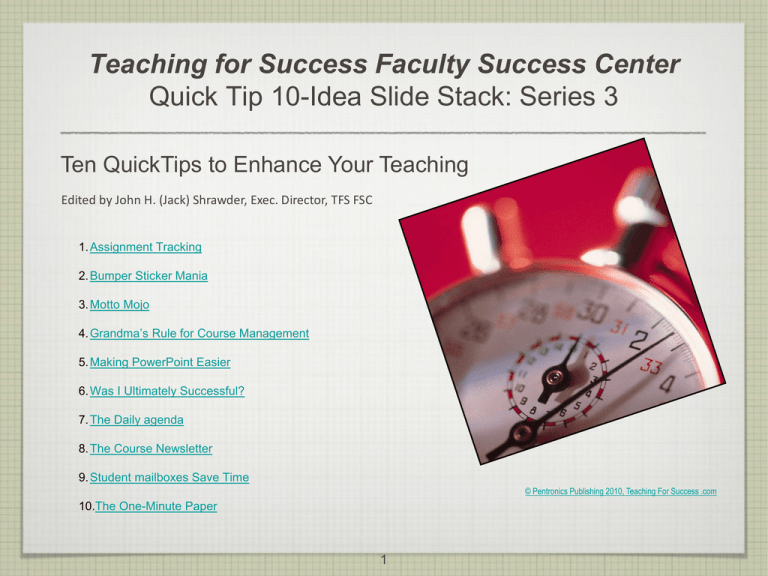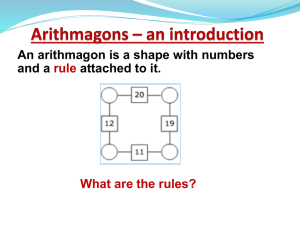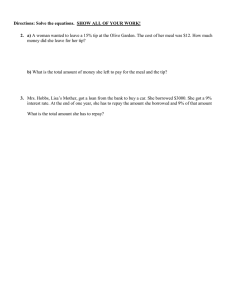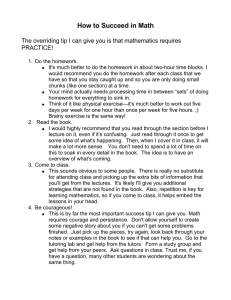QuickTip Slide Stack Series No.1_PowerPoint.ppt
advertisement

Teaching for Success Faculty Success Center Quick Tip 10-Idea Slide Stack: Series 3 Ten QuickTips to Enhance Your Teaching Edited by John H. (Jack) Shrawder, Exec. Director, TFS FSC 1. Assignment Tracking 2. Bumper Sticker Mania 3. Motto Mojo 4. Grandma’s Rule for Course Management 5. Making PowerPoint Easier 6. Was I Ultimately Successful? 7. The Daily agenda 8. The Course Newsletter 9. Student mailboxes Save Time © Pentronics Publishing 2010, Teaching For Success .com 10.The One-Minute Paper 1 Teaching for Success Quick Tip Series 1, Tip 1 ASSIGNMENT TRACKING BY KATHY HOGAN To assist students to manage their time and work load, hand out a special assignment management sheet to them at the start of a new chapter or module. This check sheet lists the assignments for the chapter and extra-credit options. Students use this form as a cover sheet when they hand in their assignments at the end of the chapter. Check off their assignments giving your students proof of acceptance, and circle the ones that are missing. Variation: Create sheet as a Word doc. or .pdf with active text fields and place on web site or email to your online students. © Pentronics Publishing 2009, Teaching For Success .com 2 Teaching for Success Quick Tip Series 1, Tip 2 BUMPER STICKER MANIA BY FRANCINE ARMENTH-BROTHERS, This technique is a terrific one for creating an engaging review of course material. I describe the following scenario in my health class: “You are drafted onto the wellness committee at work. HEALTH TOGETHER In order to promote wellness to your coworkers, your committee decides to create prototype bumper stickers.” I then cut standard 8.5 by 11 white paper into halves lengthwise and provide crayons, markers, stencils and stickers, etc. On one side of the paper, students are urged to use any concept that we have discussed during the term, and proceed to create a bumper sticker based upon that construct. On the flip side, students write an explanation of why they believe this idea is important. After a period of time, students then trade their creations with each other until everyone has a chance to read all of them. In addition, this activity is a great opportunity to answer questions and thereby increase the breadth and depth of learning. © Pentronics Publishing 2009, Teaching For Success .com 3 Teaching for Success Quick Tip Series 1, Tip 3 MOTTO MOJO BY MEG SELIG, • Use mottoes to help students remember key ideas such as the guiding rule or ideals of the class. • For example, in my Assertiveness Training course, I ask students to memorize the class motto, “No, I’m just not comfortable with that.” • This saying gives students an all-purpose phrase to use when they lack the words to handle a sticky situation. In a course on Stress Management, I offer a “Quote for the Day” for each session. • The quote is a pithy, memorable adage that is worthy of becoming the class motto for the day. I know this technique is successful when students ask, “Where’s the quote for the day?” © Pentronics Publishing 2009, Teaching For Success .com 4 Teaching for Success Quick Tip Series 1, Tip 4 GRANDMA’S RULE FOR COURSE MANAGEMENT STEVEN MCNAMARA, Psychology offers a motivational tool that is so simple and effective that anyone can use it with surprising results, yet it doesn’t cost a penny. Grandma’s Rule is the time-honored truism that when applied at the dinner table to children states: “Eat your vegetables first and then you may have your dessert.” To put it in other words: “First, do something you HAVE to do. Then, do something you WANT to do as a reward.” It’s so simple; it’s so effective. Take the example of grading a stack of student papers or tests. Unless you truly enjoy this task, turn the papers into your vegetables and then read a favorite book, take a short walk, cook your favorite dish, compose an e-mail to a friend, browse the frontiers of Web or just relax while taking a cat nap and turn that activity into your dessert. Teachers must accomplish a great amount of work each term. When you are motivated, the same work seems less daunting and overwhelming. Grandma’s Rule is a motivational tool that you should include in your management repertoire. 5 © Pentronics Publishing 2009, Teaching For Success .com Teaching for Success Quick Tip Series 1, Tip 5 MAKING POWERPOINT EASIER SANDRA ALCARAZ, PH.D. If you scratch your head every time a PowerPoint® slide overflows and wonder, “How am I going to fix this?” Here is a power tip that you may appreciate: • First, Open a Word Document. • Hit View, Outline. • Write the outline by using the outline tools; make sure that your Heading matches the title of each slide. • Save your outline and close the document. • Open PowerPoint® and start a blank presentation. • At the first slide, go to “Insert” and scroll down to “Slides from Outline.” • Choose your document from wherever you saved it in your computer. Voilá—your slides are ready! Next “Apply a Design Template” to make it look pretty and you are ready to go. When you are in a rush and want to add special effects to your slides, go to View menu, Slide Sorter (Ctrl+A), and in the Slide Sorter boxes select Random Effects and Random Transitions. © Pentronics Publishing 2009, Teaching For Success .com 6 Teaching for Success Quick Tip Series 1, Tip 6 WAS I ULTIMATELY SUCCESSFUL? WILLIAM WARD “Was I instrumental in changing lives?” I ask because teaching is my passion, my love. Many of you may never be able to answer that question to your satisfaction. Because, sometimes to teach is to give and not be assured that you made a difference. When times are tough and you need assurance, take a moment to list your students who have: • Successfully completed college credits or a certificate or degree program • • Found employment Given you a special thank you for helping them Discovered their motivation to continue in college • 7 © Pentronics Publishing 2009, Teaching For Success .com Teaching for Success Quick Tip Series 1, Tip 7 THE DAILY AGENDA CARA E. TAYLOR Begin each class by posting the agenda: • Title the agenda with the date. • Alternating with vibrant colors, list all activities that will be accomplished during the class session. • Think of captivating titles that will spark interest and curiosity among the students about each planned activity. A review of Chapter 7 might be, “Chatting About China.” • Highlight the break time, and note when students are to return to class. • End the daily agenda with a positive comment, such as “Head for Home” or “See You Next Wednesday.” Knowing what to expect students can be more efficient an focused. © Pentronics Publishing 2009, Teaching For Success .com 8 Teaching for Success Quick Tip Series 1, Tip 8 THE COURSE NEWSLETTER CARA E. TAYLOR Another organizational technique is to create a course newsletter [paper or electronic]. • • • • Headline the newsletter with a catchy title, such as “The Calculus Connection” or “History 101 Highlights.” include an inspirational quote at the top. In a table format, list assignments, readings and Due Dates. Highlight important information that may include: • specific assignment requirements • • • changes in the syllabus • Leave room for notes. answers to student questions clarification of course issues © Pentronics Publishing 2009, Teaching For Success .com 9 Teaching for Success Quick Tip Series 1, Tip 9 STUDENT MAILBOXES SAVE TIME CARA E. TAYLOR To streamline the task of delivering handouts and returning assignments: • provide students with their own mailboxes. • This can easily be done with a plastic crate and file folders. • Label each file folder with the student’s name and place it in the crate alphabetically. • Before each class, fill the student’s mailboxes with handouts they will be using for that session. Include chapter outlines, activities to be done that day, or graded assignments • Place the crate in a location near the door, so students can get their mail when they enter class. © Pentronics Publishing 2009, Teaching For Success .com 10 Teaching for Success Quick Tip Series 1, Tip 10 THE ONE-MINUTE PAPER DONALD A PETKUS, It’s has been around for some time, but it’s well worth revisiting because of what it can do for you and your students. It provides you with a chance for obtaining quick feedback on how your students feel their progress is going. It gives students a chance to say, “I don’t understand” without having to draw attention to themselves. Or to say, “I get it, already!” You don’t need to spend too much time on a concept I have already mastered. Also, it produces important information needed to customize the next class lecture notes or plan a carefully targeted review session. Although the one-minute paper calls for informal, spontaneous writing, it also offers another way to assess the students’ writing skills, learning styles, critical thinking skills and content mastery. Most importantly, it helps me to improve my teaching. © Pentronics Publishing 2009, Teaching For Success .com 11




